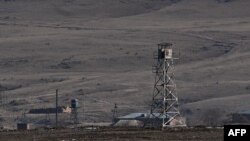Special envoys from Turkey and Armenia met in Moscow on Friday for the first round of talks to normalize the decades-long strained relations between the two countries.
Some experts in Turkey view the meeting as “a hopeful first step,” given that Turkey and Armenia have had no diplomatic relations since the 1990s.
“We are glad that the dialogue has started after many years. We are here talking about two neighboring countries, so we think that there should be neighborly relations,” Luiz Bakar, a lawyer from the Armenian community in Turkey, told VOA.
Bakar noted that starting a dialogue is “an important step” and that she hopes it will continue.
Previous attempts
After decades of distrust dating from World War I, Turkey and Armenia signed a peace accord in 2009, but their parliaments did not ratify it. The meeting in Moscow is the first attempt to restore ties and open borders since then.
Friday's meeting was “conducted in a positive and constructive atmosphere,” the Turkish and Armenian foreign ministries said in written statements, adding that they are aiming for full normalization.
They said the envoys agreed to “continue negotiations without preconditions,” and the next meeting's date and venue will be finalized “in due time through diplomatic channels.”
Several contentions
The neighboring countries have many points of contention, including the mass killings of Armenians in 1915. Armenia says 1.5 million people were killed in 1915, calling it a genocide, as do the United States and some other countries.
Turkey denies genocide or any systematic killings of Armenians but accepts that many Armenians living in the Ottoman Empire were killed in clashes with Ottoman forces during World War I.
In 2020, tensions between the two countries flared again over the disputed Nagorno-Karabakh territory.
Turkey backed Azerbaijan in the Nagorno-Karabakh conflict and accused Armenia of occupying the land. During the conflict, Turkey’s defense industry was a supplier to the Azerbaijani forces.
Some Turkish experts call the meeting in Moscow “a turning point” and argue that Azerbaijani control over Nagorno-Karabakh enabled such normalization attempts between Turkey and Armenia.
“When Azerbaijan regained its territory after the 44-day-long war in Nagorno-Karabakh, there were developments about the public opinion on starting a dialogue. In a way, a fundamental problem on the normalization of diplomatic relations and the opening of borders has disappeared,” Talha Kose, an associate professor at Ibn Haldun University in Istanbul, told VOA.
“Of course, we are talking about a fragile peace here, so we still cannot say that the issues between Azerbaijan and Armenia have completely disappeared. An important step has now been taken to normalize relations, and I am optimistic about this,” Kose added.
Aydin Adnan Sezgin, a former Turkish ambassador to Moscow and a deputy for the nationalist opposition Good Party (IYI Party), said he is pleased with the dialogue step between the two countries, noting that it is important to see how the Armenian diaspora responds to the normalization attempts.
"This time, I hope that the Yerevan administration will take steps for the welfare and peace of the people in Armenia and by considering them as a priority. Some sections of the Armenian diaspora will try to prevent relations. However, if the Yerevan administration shows determination, improving relations with Turkey will also help the people in Armenia,” Sezgin told VOA.
VOA’s Turkish Service’s Ezel Sahinkaya contributed to this report.
Some information in this report came from Reuters.




